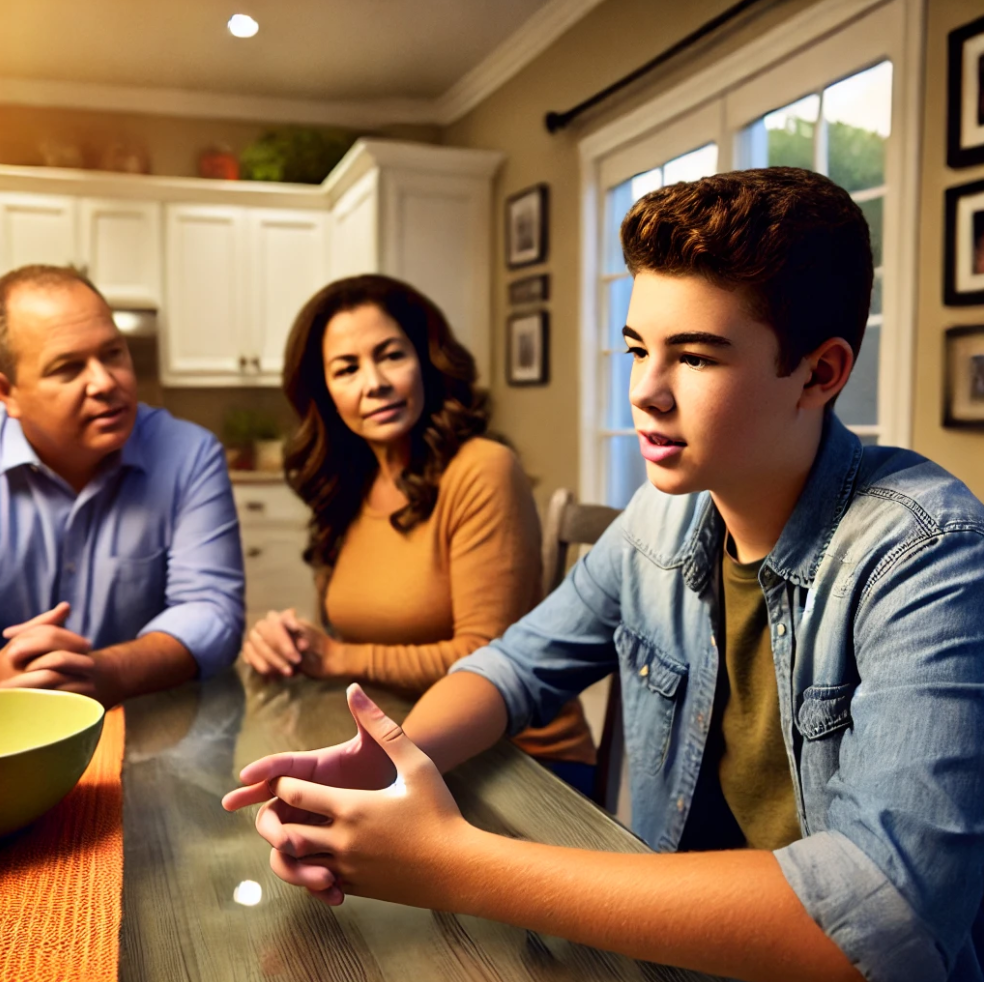What to Do When Your Teenager Feels They Aren’t Treated Fairly
It’s common for teenagers to feel misunderstood or unfairly treated at home. Whether it’s about rules, responsibilities, or privileges, teens are at an age when they’re figuring out who they are and are especially sensitive to fairness. If your teenager tells you they don’t feel treated fairly, this can be an opportunity to strengthen your relationship and help them develop resilience and perspective.

Understanding the Teenage Perspective on Fairness
During adolescence, children experience significant cognitive and emotional growth, which affects their view of fairness. According to Dr. Laurence Steinberg, a developmental psychologist, teens are increasingly aware of social justice and equality, which extends to how they view their place in the family. They’re also developing their own identity, which can lead to greater sensitivity when they feel they’re being treated unfairly compared to siblings or friends .
Fairness, however, doesn’t always mean treating everyone exactly the same. Psychologist Dr. Michael Thompson explains that fairness is about meeting each child’s individual needs. Parents often make decisions based on a teen’s maturity, needs, or abilities, which can sometimes lead teens to feel that others are getting special treatment .
Responding Supportively When Your Teen Expresses Feelings of Unfairness
When your teen says they feel unfairly treated, responding in a supportive and constructive way can help them feel valued and understood. Here are some strategies:
1. Listen Without Judgment
- When your teen tells you they feel unfairly treated, listen calmly and let them explain their feelings without interruption. According to Dr. John Gottman, an expert in family relationships, active listening can make children feel respected and valued, which helps foster a trusting and open relationship .
- Try to validate their feelings by saying things like, “I understand that you feel this way,” even if you don’t agree. Validation doesn’t mean agreeing, but it lets your teen know their emotions are acknowledged.
2. Explain Fairness Versus Equality
- Fairness in parenting often means giving each child what they need, which may look different depending on age, maturity, and individual needs. For example, a younger sibling might have a different bedtime or a different set of responsibilities. Explaining the difference between fairness and equality can help your teen see why each family member might be treated differently.
- Family therapist Dr. Jane Nelsen explains that explaining this distinction can reduce resentment and help children understand that they are not being “punished” or unfairly limited, but rather given what’s appropriate for their stage of development .
3. Ask Questions to Understand Their Perspective
- To fully understand why your teen feels unfairly treated, ask open-ended questions like, “Can you tell me more about why you feel this way?” or “What would make this situation feel fairer to you?” Open-ended questions help you see things from their perspective and show your teen that you’re genuinely interested in understanding their feelings .
- Research shows that when teens feel heard and understood by their parents, they’re more likely to accept decisions, even if they don’t fully agree .
4. Acknowledge Your Own Mistakes
- If there are times when you realize you may have been unfair without realizing it, don’t be afraid to admit it. Admitting mistakes can strengthen trust between you and your teen and show them that fairness matters to you as well.
- Dr. Brené Brown, a researcher on vulnerability and family relationships, argues that admitting mistakes as a parent models accountability and teaches teens that it’s okay to acknowledge imperfections .
Setting Clear Expectations and Boundaries
While understanding their feelings is important, consistency is key. Clear boundaries help teenagers feel secure and understand why rules are in place. Setting expectations and explaining the reasons behind rules can make them seem fairer to your teen.
1. Discuss Expectations Openly
- Have conversations with your teen about what is expected of them and why. When parents and teens discuss expectations together, it helps clarify boundaries and can prevent feelings of unfairness. For instance, explaining why curfews differ based on age or responsibility level can make the rules seem more reasonable .
- Psychologist Dr. Wendy Mogel suggests involving teens in discussions about rules, which makes them feel more invested and responsible for their own actions .
2. Be Consistent with Consequences
- Consistency helps teens understand that rules apply to everyone in the family. If consequences are only enforced sometimes, teens may feel that rules are unfairly applied.
- Consistent consequences, when applied in a fair and non-emotional way, reinforce the idea that rules are about safety and responsibility, not favoritism.
Helping Your Teen Build Resilience and Perspective
Feelings of unfairness can be an opportunity for growth. Learning to handle situations that feel unfair helps teenagers develop resilience and prepares them for situations outside the family.
1. Encourage Problem-Solving Skills
- If your teen feels that a situation is unfair, work with them to brainstorm ways to improve it. For example, if they feel they have too many chores compared to a sibling, you might discuss a more balanced approach or find ways to rotate tasks. This teaches them to address perceived unfairness in constructive ways .
- Studies show that encouraging teens to engage in problem-solving fosters independence and resilience, helping them deal with challenges throughout life .
2. Model Empathy and Perspective-Taking
- Encourage your teen to consider others’ perspectives as well. Ask questions like, “Why do you think your sibling might have different responsibilities?” or “How do you think we try to balance everyone’s needs?” This teaches empathy and helps your teen see family dynamics in a broader context.
- Research by developmental psychologist Dr. Nancy Eisenberg suggests that teaching empathy and perspective-taking can enhance social skills and emotional intelligence in adolescents .
Wrapping It Up: Fairness, Understanding, and Family Growth
Feeling unfairly treated is a common experience for teens, and how parents respond can shape their future interactions with others. By listening, validating feelings, explaining fairness versus equality, and involving them in discussions about expectations, you can build a more open and trusting relationship with your teen. And when misunderstandings occur, remember that these moments are opportunities to strengthen family bonds, build resilience, and help your teenager feel valued.
Every family dynamic is unique, and while it may not always be possible to avoid feelings of unfairness, responding with empathy, consistency, and open communication can help your teenager feel respected and understood.

This article has been written by John S. Collier, MSW, LCSW. Mr. Collier has over 25 years of experience in the social work field and is based in London Kentucky through Southeast Kentucky Behavioral Health, LLC. Mr. Collier may be reached by phone at (606) 657–0532 extension 101 or by email at john@sekybh.com.
References
1. Steinberg, L. (2014). Age of Opportunity: Lessons from the New Science of Adolescence. Houghton Mifflin Harcourt.
2. Thompson, M. (2009). It’s a Boy!: Understanding Your Son’s Development from Birth to Age 18. Ballantine Books.
3. Gottman, J. (1997). Raising an Emotionally Intelligent Child: The Heart of Parenting. Simon & Schuster.
4. Nelsen, J. (2006). Positive Discipline for Teenagers: Empowering Your Teens and Yourself Through Kind and Firm Parenting. Ballantine Books.
5. Brown, B. (2012). Daring Greatly: How the Courage to Be Vulnerable Transforms the Way We Live, Love, Parent, and Lead. Penguin Books.
6. Mogel, W. (2008). The Blessing of a B Minus: Using Jewish Teachings to Raise Resilient Teenagers. Scribner.
7. Eisenberg, N., & Spinrad, T. L. (2004). “Emotion-Related Regulation: Its Role in the Development of Empathy and Prosocial Behavior.” Annual Review of Psychology, 55, 535–570.




